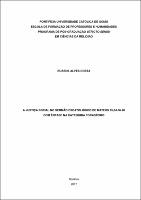| Compartilhamento |


|
Use este identificador para citar ou linkar para este item:
http://tede2.pucgoias.edu.br:8080/handle/tede/3681Registro completo de metadados
| Campo DC | Valor | Idioma |
|---|---|---|
| dc.creator | Costa, Rubens Alves | - |
| dc.creator.Lattes | http://lattes.cnpq.br/3265902134760866 | eng |
| dc.contributor.advisor1 | Ferreira, Joel Antônio | - |
| dc.contributor.advisor1Lattes | http://lattes.cnpq.br/7610590480120003 | eng |
| dc.contributor.referee1 | Silva, Valmor da | - |
| dc.contributor.referee1Lattes | http://lattes.cnpq.br/9309261304512694 | eng |
| dc.date.accessioned | 2017-05-12T14:14:31Z | - |
| dc.date.issued | 2017-03-22 | - |
| dc.identifier.citation | Costa, Rubens Alves. A JUSTIÇA SOCIAL NO SERMÃO ESCATOLÓGICO DE MATEUS 25,34-36.40 COM ÊNFASE NA CATEGORIA FORASTEIRO. 2017. 158 f. Dissertação (Programa de Pós-Graduação STRICTO SENSU em Ciências da Religião) - Pontifícia Universidade Católica de Goiás, Goiânia - GO. | eng |
| dc.identifier.uri | http://tede2.pucgoias.edu.br:8080/handle/tede/3681 | - |
| dc.description.resumo | Esta dissertação propõe abordar o Sermão Escatológico do Evangelho de Mateus 25,34-36.40 como denunciador de ambientes sem justiça social nos contextos sociais da Palestina e no Sul da Síria do primeiro século d.C. A pesquisa tem como objetivos destacar que a injustiça social é uma construção de diversos segmentos e evidenciar que a meta social de Jesus era implantar um Reino fundamentado na justiça social, conforme o Evangelista Mateus. Entre os segmentos construtores de injustiça social apontam-se o governamental e religioso que se acomodam ao status quo vigente e assim não têm interesse em mudanças. Aborda-se a questão da justiça social a partir da perspectiva da sociologia conflitual. A hipótese pesquisada está fundamentada na proposição de que o Jesus Cristo descrito por Mt 25,34-36.40 é dos miseráveis. Mateus aponta para um Jesus que está no meio de quem tem fome, sede, é forasteiro, estava nu, enfermo e preso. Então, são os que fazem boas obras que entrarão na posse do Reino. Para a investigação da hipótese trata-se no primeiro capítulo do contexto histórico e de como eram articuladas as categorias fome, sede, forâneos, desnudos, doentes e presos no Sermão Escatológico de Mateus e em que elas contribuíram para a formação do contexto comunitário mateano de injustiça social. No segundo capítulo é feita a exegese do texto sagrado a partir do método histórico-crítico. No terceiro capítulo busca-se atualizar o texto de Mt 25,34-36.40 estudando o fenômeno migratório haitiano para o Brasil que ocorreu depois do terremoto de 2010. Conclui-se que a injustiça social continua presente na sociedade atual e que os mesmos mecanismos geradores na época do Evangelista Mateus continuam sob outros formatos hodiernamente. | eng |
| dc.description.abstract | This dissertation proposes to approach the Eschatological Sermon of the Gospel of Matthew 25,34-36.40 as denunciator of environments without social justice in the social contexts of Palestine and in South Syria of the first century A.C.The research aims to highlight that social injustice is a construction of several segments and to show that Jesus' social goal was to implant a Kingdom based on social justice, according to the Evangelist Matthew. Among the constructive segments of social injustice are the governmental and religious that conform to the current status quo and thus have no interest in change. The question of social justice is approached from the perspective of conflicting sociology. The hypothesis is based on the proposition that "The Jesus Christ described by Matt 25: 34-36.40 is of the miserable. Matthew points to a Jesus who is among the hungry, thirsty, stranger, naked, sick, and stuck. So it is those who do good works who will come into possession of the Kingdom". In order to investigate the hypothesis, the first chapter of the historical context and how the categories hunger, thirst, outsiders, nudes, patients and prisoners in the Eschatological Sermon of Matthew were articulated and in which they contributed to the formation of the social injustice. In the second chapter the exegesis of the sacred text is made from the historical-critical method. The third chapter seeks to update the text of Mt 25,34-36.40 by studying the Haitian migratory phenomenon for Brazil that occurred after the earthquake of 2010. It is concluded that social injustice is still present in today's society and that the same mechanisms generate in the time of the Evangelist Matthew continue in other formats nowadays. | eng |
| dc.description.provenance | Submitted by admin tede ([email protected]) on 2017-05-12T14:14:31Z No. of bitstreams: 1 RUBENS ALVES COSTA.pdf: 1079488 bytes, checksum: fad065aa893b1e9123a83cc7ddfd703b (MD5) | eng |
| dc.description.provenance | Made available in DSpace on 2017-05-12T14:14:31Z (GMT). No. of bitstreams: 1 RUBENS ALVES COSTA.pdf: 1079488 bytes, checksum: fad065aa893b1e9123a83cc7ddfd703b (MD5) Previous issue date: 2017-03-22 | eng |
| dc.format | application/pdf | * |
| dc.thumbnail.url | http://tede2.pucgoias.edu.br:8080/retrieve/11125/RUBENS%20ALVES%20COSTA.pdf.jpg | * |
| dc.language | por | eng |
| dc.publisher | Pontifícia Universidade Católica de Goiás | eng |
| dc.publisher.department | Escola de Formação de Professores e Humanidade::Curso de Teologia | eng |
| dc.publisher.country | Brasil | eng |
| dc.publisher.initials | PUC Goiás | eng |
| dc.publisher.program | Programa de Pós-Graduação STRICTO SENSU em Ciências da Religião | eng |
| dc.rights | Acesso Aberto | |
| dc.subject | justiça social, injustiça social, Evangelho de Mateus, estrangeiro, misericórdia. | por |
| dc.subject | social justice, social injustice, Gospel of Matthew, foreigner, mercy. | eng |
| dc.subject.cnpq | CIENCIAS HUMANAS::TEOLOGIA | eng |
| dc.title | A JUSTIÇA SOCIAL NO SERMÃO ESCATOLÓGICO DE MATEUS 25,34-36.40 COM ÊNFASE NA CATEGORIA FORASTEIRO | eng |
| dc.title.alternative | The Social Justice in the Eschatological Sermon of Matthew 25: 34-36.40 with emphasis on the outsider category. | eng |
| dc.type | Dissertação | eng |
| Aparece nas coleções: | Mestrado em Ciências da Religião | |
Arquivos associados a este item:
| Arquivo | Descrição | Tamanho | Formato | |
|---|---|---|---|---|
| RUBENS ALVES COSTA.pdf | Texto Completo | 1,05 MB | Adobe PDF |  Baixar/Abrir Pré-Visualizar |
Os itens no repositório estão protegidos por copyright, com todos os direitos reservados, salvo quando é indicado o contrário.




